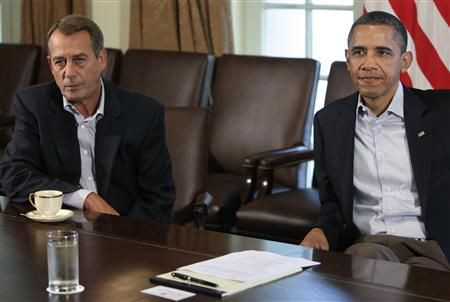Debt crisis gives investors first jolt

President Barack Obama's Democrats and their Republican rivals were further apart than ever on Tuesday in an impasse over the government's debt limit as investors braced for a looming default and downgrade.
With a deadline just a week away, the top Republican in Congress pressed his deficit reduction plan toward an expected vote on Wednesday. But it appears to have little chance of success in the face of a veto threat from Obama and opposition from fiscal conservatives in his own party.
There was no compromise in sight between competing plans to raise the government's $14.3 trillion borrowing limit to avert a potential default on some of its $9.6 trillion in bonds -- which could push the United States back into recession and send shock waves through global financial markets.
The Treasury has said the government of the world's biggest economy will start to run out of money to pay its bills by August 2 unless Congress acts.
With lawmakers in Washington starkly at odds and seemingly more intent on scoring political points than defusing the debt crisis, corporate America was growing increasingly nervous.
Credit rating agencies have threatened to cut America's top-notch bond rating if an increase in the debt limit is not accompanied by action to control long-term deficits. Such a deal seems increasingly unlikely to emerge from brinkmanship in Washington that has bordered on dysfunction.
Big banks are preparing for the real possibility the United States will lose its top credit rating, which they said would cost the country $100 billion in higher interest payments and hurt consumers and the economy.
"That's an environment where hiring is going to be much less likely than it otherwise would be," Mike Hanson, senior U.S. economist at Bank of America Merrill Lynch, said on a conference call organized by a Wall Street trade group, the Securities Industry and Financial Markets Association.
JITTERY MARKETS
The acrimony that has exposed an ideological chasm between Republicans who control the House of Representatives and Democrats who control the Senate is seen as an attempt by each side to blame the other for persistent economic and fiscal woes before the 2012 election when Obama is seeking a second term.
The stalemate in Washington is already having an effect, with investors starting to take cash out of the market and shifting away from some long-term investments.
The U.S. dollar fell broadly on Tuesday, helping to support crude oil prices, while gold hovered near a record high above $1,619 an ounce as investors sought safety. The debt gridlock also hit U.S. stocks.
Underscoring the risks, United Parcel Service Inc, the world's largest package delivery company, cited the stalled debt talks as a reason for uncertainty in its quarterly earnings report. Its shares fell 3.3 percent.
A Reuters poll showed 30 of 53 economists surveyed over the past two days said the United States will lose its top credit rating from one of the three big ratings agencies -- Standard & Poor's, Moody's and Fitch. Most said the wrangling over debt already has damaged the economy.
Obama and Republican House Speaker John Boehner delivered dueling televised addresses on Monday and gave no ground in the bitter debate over how to raise the borrowing limit.
AMERICANS PREFER COMPROMISE
A Reuters/Ipsos poll found Americans are overwhelmingly concerned about the debt crisis and a majority back the type of compromise pushed by Obama to end the impasse.
The poll showed 56 percent said lawmakers and Obama should agree to a combination of tax hikes and cuts to government programs -- the strategy the president has promoted and Republicans have rejected -- to end the deadlock.
Boehner on Tuesday sought to rally support for his two-stage plan, which would start with an initial $1.2 trillion in savings over 10 years. Obama opposes it because it would raise the debt limit for only a few months, something he has said he will not agree to.
Passage of the Boehner plan is seriously in doubt because of opposition from fiscal hawks in the Republican camp aligned with the conservative Tea Party movement -- the group insisting on no increase in tax revenue and no compromise with Obama.
Boehner insisted his proposal can pass and, in a closed-door meeting, urged Republicans to stick together. But some influential conservative organizations urged lawmakers to oppose it and warned that their votes would be tracked.
Representative Jim Jordan, who heads a group of more than 170 conservative Republicans in the House, predicted Boehner would not be able to round up the votes needed.
The White House said Obama's advisers would recommend vetoing the bill if it reached his desk but initial reaction from investors remained cautiously optimistic.
"I don't think people would think it was dead in the water if you get something that passes," Ian Lyngen, senior government bond strategist at CRT Capital Group.
Obama's Democrats have presented their one-step plan for $2.7 trillion in deficit reduction over the next decade but with a debt limit hike that would carry through the November 2012 elections.
Senate Majority Leader Harry Reid, a Democrat, is expected to hold off on a vote on the plan until the House takes up Boehner's proposal. But Reid's measure is also not likely to pass as he needs seven Republican votes.
© Copyright Thomson Reuters 2024. All rights reserved.





















